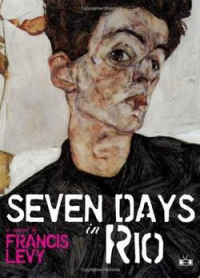by Francis Levy
Reviewed by Nathan Huffstutter
2011, Two Dollar Radio
146 pages, advance review copy
In addition to holding a third-degree black belt, Francis Levy knows a thing or two about raising hell. Still, after glutting his first two novels with a blitz of psychosexual disorders and more bare-assed buggery than a stroke mag, should a stranger stop Levy on the subway and gush about being a huge, HUGE fan, the author’s first instinct would have to be an uh-oh backward step.
 Installations sure to provoke as many walkouts as donors, Erotomania: A Romance and Seven Days in Rio offer opposite sides of the same satyric coin, with the former presenting by far the stickier flip. Despite its heady conceptual foundation, exploring animal instinct, recapitulation theory, and the dawning of human consciousness amid an evolving relationship, at the page-level, Erotomania’s boy-meets-nympho love story mostly just cums in your face. Liberated from his debut’s tedium of assplay and fluid discharge, Levy unleashes Seven Days in Rio as a no less frisky but much freer beast: where Erotomania propped the pounding over and over and over of compulsive sex atop an illusive psychoanalytic foundation, Rio props psychoanalysis atop an illusion, or delusion, of breezy tropical sex.
Installations sure to provoke as many walkouts as donors, Erotomania: A Romance and Seven Days in Rio offer opposite sides of the same satyric coin, with the former presenting by far the stickier flip. Despite its heady conceptual foundation, exploring animal instinct, recapitulation theory, and the dawning of human consciousness amid an evolving relationship, at the page-level, Erotomania’s boy-meets-nympho love story mostly just cums in your face. Liberated from his debut’s tedium of assplay and fluid discharge, Levy unleashes Seven Days in Rio as a no less frisky but much freer beast: where Erotomania propped the pounding over and over and over of compulsive sex atop an illusive psychoanalytic foundation, Rio props psychoanalysis atop an illusion, or delusion, of breezy tropical sex.
“I’m Kenny,” I said. “Do you understand anglais? I am new to your country and I wanted to introduce myself while also initiating myself into your highly permissive sexual culture. I will put my cards on the table: I’d be glad to engage you to perform sexual acts on me for a fee.”
And there you have it. Speaking these first words to the first woman he sees, Manhattan CPA/seasoned sex tourist Kenny Cantor lays out his raison d’etre: he’s vacationing in Brazil exclusively to pay for sex, with the term pay being of much greater importance than any specific copulative act. Equal parts George Will and Lloyd Christmas, Cantor strolls Rio in a bowtie and seersucker suit, imagining every female passerby to be either a current or former prostitute. For Cantor, the entire opposite sex is reduced to the pet-name “Tiffany” (an Anna Freud reference?), and a parade of exotic Tiffanys proposition him by freely hiking up their skirts or being fully nude from the outset. Despite these apparent vaginal gimmes, Cantor blunders from one unfulfilling encounter to another, from the call girl who turns his hotel room into her own wireless office to the educated beauty who hails from a dynasty of wealthy whores to the lusty, busty hotel clerk whose only flaw is her refusal to charge.
Never consummating these picaresque trysts, Cantor is bedeviled by the allure of greater allure: forever rejecting the bird in hand, he remains obsessed by all those left in the…ugh, no, I refuse to write it. Suffice it to say, before sealing his end of the deal, Cantor inevitably backs out, leaving no slang unturned as he sets out for an even more idealized vision of “velvety folds” and “Venus Mounds,” a “hairy pussy with the hairstyles of geniuses like Mozart, Beethoven, and Einstein,” a “hairy bush lying next to me every night, offering me solace like my old dog, whose furry snout was always within reach.”
Okay, so it ain’t Springer’s Progress. Levy flashes billboards for us to remain mindful of the juncture between high and low art, even going so far as to offer up Sontag doppelgangers and hookers versed in Against Interpretation, but where Markson’s bawdy, bodily-obsessed Loosh Springer was able to translate his baser urges into Joycean ecstasy, Cantor’s default register is middlebrow Mcdonald, a horndog Fletch tossing off quips and charging the entire vacation on the Underhill’s tab.
“For a while I was dating a Tiffany who had acquired post-graduate credits in anthropology at the New School, and besides the boners she gave me, she also inspired me to bone up on the latest developments in evolution.”
Though Levy doesn’t craft sentences with Sam Lipsyte’s verve, Seven Days in Rio also calls to mind The Ask, sharing both the same throw-it-up-against-the-wall humor and a fundamental narrative quandary: in The Ask, the more capably Lipsyte developed Milo Burke as a prototypical schlub, the more far-fetched it became that Milo might once have had the vision and dynamic sensibility of a hotshot young painter. Like Lipsyste, Levy has far more on his mind than his chosen characters, and both Erotomania and Rio use backstory as a topical backdoor. Juxtaposed with sequences that require his narrators to think and act in a manner that is, shall we say, zealously unenlightened, Levy shoehorns tidbits of incompatible personal history that ring false at the character level, but allow authorial entrée into elevated notions of philosophy, psychology, and art. As narrators, Kenny Cantor’s older CPA and Erotomania’s everydude sex-fiend James are vocal dead-ringers, a timbre that’s ultimately all Francis. And as the author uses his conduits to drop references from his own personal arsenal, strings tangle, lips move, credibility strains.
In addition to inconsistent (as differentiated from unreliable) narrators, Levy’s prose also suffers from the sort of unfinished quality that raises the question of whether Seven Days in Rio represents the novel he envisioned or if it’s the novel he settled for. His natural storytelling style is summative – this happened, then that happened, which reminds me of this thing that happened years ago, and that connection’s interesting for these reasons – and he delivers his paragraphs as chunks and dumps of exposition. These tell-tell-tell paragraphs are repeatedly connected by early-draft phrases: “it turned out that,” “as it happened,” “it suddenly reminded me of,” and “which is known as,” compositional scaffolding that’s typically dismantled before the tourists arrive.
This summative style drifts into missed-opportunity as the narrative shifts to a psychoanalysts’ convention taking place at Cantor’s Copacabana Hotel. Also a promiscuous therapy-hopper, Cantor initiates an intensive course of Lacanian sessions with China Dentata, a ravishing Asian fetish/conference attendee. Cantor’s enduring fantasy is to out-analyze his analysts, and in a negating flurry of transference and counter-transference, he condenses years of “work” and “attachment” into a succession of consecutive, one-minute appointments. China approaches these sessions from the same angle Sharon Stone approached police interrogation, and between the spectacle of Cantor leaving the room and knocking on the door after each “appointment,” China’s lurid leg-crossing, and any relevant dialogue bound by the ticking clock, these comic sessions beg to be dramatized in the moment, yet Levy still filters the scenes through after-the-fact narration.
Despite lampooning Lacan’s embrace of truncated sessions, as psychoanalysis moves to the narrative foreground, Levy seems to be allowing a reading of Rio through the lens of Lacan’s Three Orders: the imaginary, the symbolic, and the real. Alternately, the entire novel may be less a travelogue than a log of delusion, the procession of willing “Tiffanys” actually the product of De Clerambault’s Syndrome – it’s entirely possible Cantor isn’t in Brazil at all, since the destination seems to have been chosen less for its local color than its local currency, the Real, allowing Cantor to refer to his frequent cash exchanges as a dose of reality.
Can you satirize a delusion? Does the literal absurd merit deep psychoanalysis? Stripped of superimposed lenses, is a crotch shot just a crotch shot? Like Kenny Cantor, Francis Levy may want so badly to have it all that he risks ultimate frustration, trying to take on more readings than he can satisfy. I doubt he’d have it any other way.







